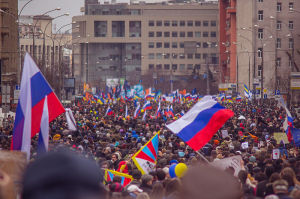Minsk Ceasefire in Doubt: Was it Ever Meant to Be?
 Two months ago, on September 5th, Ukraine and the pro-Russia rebels in the Donbas proclaimed a ceasefire that would de-escalate the situation and create a lasting peace in the country; Russia was also a signatory to this plan. However, on Sunday November 9th, the Ukrainian government claimed to have killed at least 200 rebels in a heated battle over the Donetsk Airport. Parallel, the Organization for Security and Cooperation in Europe (OSCE) published a report on November 8th stating that an unmarked armed convoy was moving through Eastern Ukraine, and though the Organization did not specify its origin, the Ukrainian government accused Russia as the culprit. Also taking into account the elections held in the separatists regions on November 2nd, it appears that the Minsk Ceasefire exists in name only. Given, its prospects were never bright seeing how neither parties trusted the other enough to refrain from firing.
Two months ago, on September 5th, Ukraine and the pro-Russia rebels in the Donbas proclaimed a ceasefire that would de-escalate the situation and create a lasting peace in the country; Russia was also a signatory to this plan. However, on Sunday November 9th, the Ukrainian government claimed to have killed at least 200 rebels in a heated battle over the Donetsk Airport. Parallel, the Organization for Security and Cooperation in Europe (OSCE) published a report on November 8th stating that an unmarked armed convoy was moving through Eastern Ukraine, and though the Organization did not specify its origin, the Ukrainian government accused Russia as the culprit. Also taking into account the elections held in the separatists regions on November 2nd, it appears that the Minsk Ceasefire exists in name only. Given, its prospects were never bright seeing how neither parties trusted the other enough to refrain from firing.
How did the Minsk Ceasefire falter so quickly and disintegrate to the brink of renewed all-out war? Simply put, neither the Ukrainian government nor the separatists wanted to cement the status-quo. The two rebel regions, the Luhansk and Donetsk People’s Republics, proclaimed independence in May, and Ukraine shows no signs of willingness to let the two provinces break away from the country. The ceasefire was only desirable once the separatists were able to launch a counter-attack on the advancing Ukrainian army, and take over Novoazovsk and gain a foothold on the Black Sea – with alleged help from Russian regular armed forces. This placed the Ukrainian government in a position of weakness, and although they gained a small respite with the Minsk Ceasefire, the two sides were still engaged in sporadic fighting across the East. However, having left the balance of power in the air, neither side had the overwhelming power to put an end to the conflict – nor it does not appear like they have it now. The diametrically opposed interests of the belligerent parties make any negotiated peace almost impossible – the rebels want nothing to do with Ukraine, Ukraine will not surrender its integral territory, and Russia continues to abate by the conflict by dialing its support to the rebels as the conflict protracts.
The efforts by Western Europe and the Ukrainian government to solve the crisis through negotiation have been well-intentioned, but the actions of the pro-Russian separatists have indicated that the only palatable negotiated settlement for them would be “independence” and some form of synchronization with Russia. However, the independent agency of the Donetsk and Luhansk rebels has been in question since the uprising in April, but Russia’s obfuscating information tactics have made determining the actual nature of the war difficult, to say the least. Moscow has maintained an apparent distance between itself and the Donbas rebels, making the Ukrainian government dialogue with a quasi-independent third party that continues to receive the bulk of its military edge from Russia.
After the OSCE confirmed the presence of an armed convoy in the Donbas, the United States warned that “Any attempt by separatist forces to seize additional territory in eastern Ukraine would be a blatant violation of the Minsk agreements", but the question is: what would be the response to a “blatant violation” of the Minsk Ceasefire? More sanctions, increased military aid for Ukraine? The Minsk Ceasefire is teetering on the edge, and the prospects of the separatists and Kiev agreeing to a comprehensive peace seem far-off. If anything, the chronicle of the Minsk Ceasefire foreshadow a longer conflict in which neither side can claim victory simultaneously. Since February, Russia has appeared to be ten steps ahead of Ukraine and the West in the Donbas and Crimea, willing to bear the brunt of economic sanctions to fulfill its unknown endgame. A stalemate would be a tragic defeat for Ukraine and the West – who have championed this war in defense of their ideals of international relations – but it would mean a resounding victory for Russian strategic goals, as a stalemate would place Ukraine in a “frozen conflict” (akin to Georgia’s breakaway republics) and stall its march toward Western integration. In the end, however, this conflict will be decided by a question of resolve and capabilities. The images on the ground foretell that this conflict will not be solved by quick roundtable discussions, and if that’s the case, to what extent will Russia, Ukraine, the West, the pro-Russia rebels be willing to fight to achieve their objectives?
